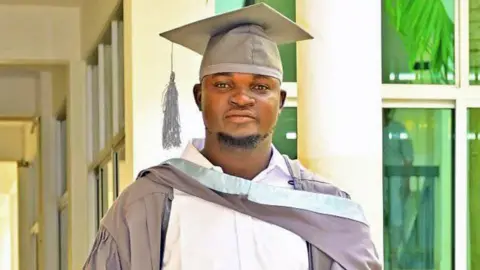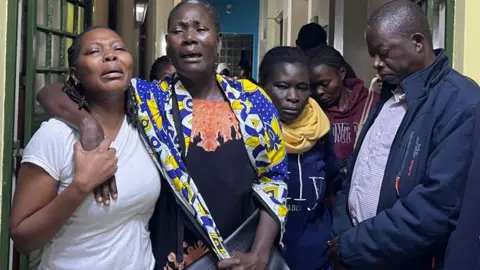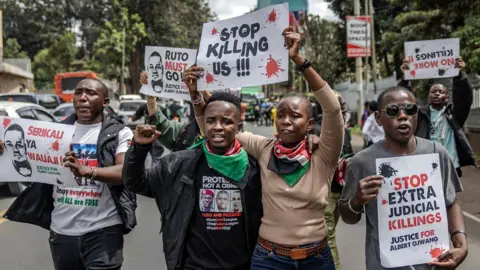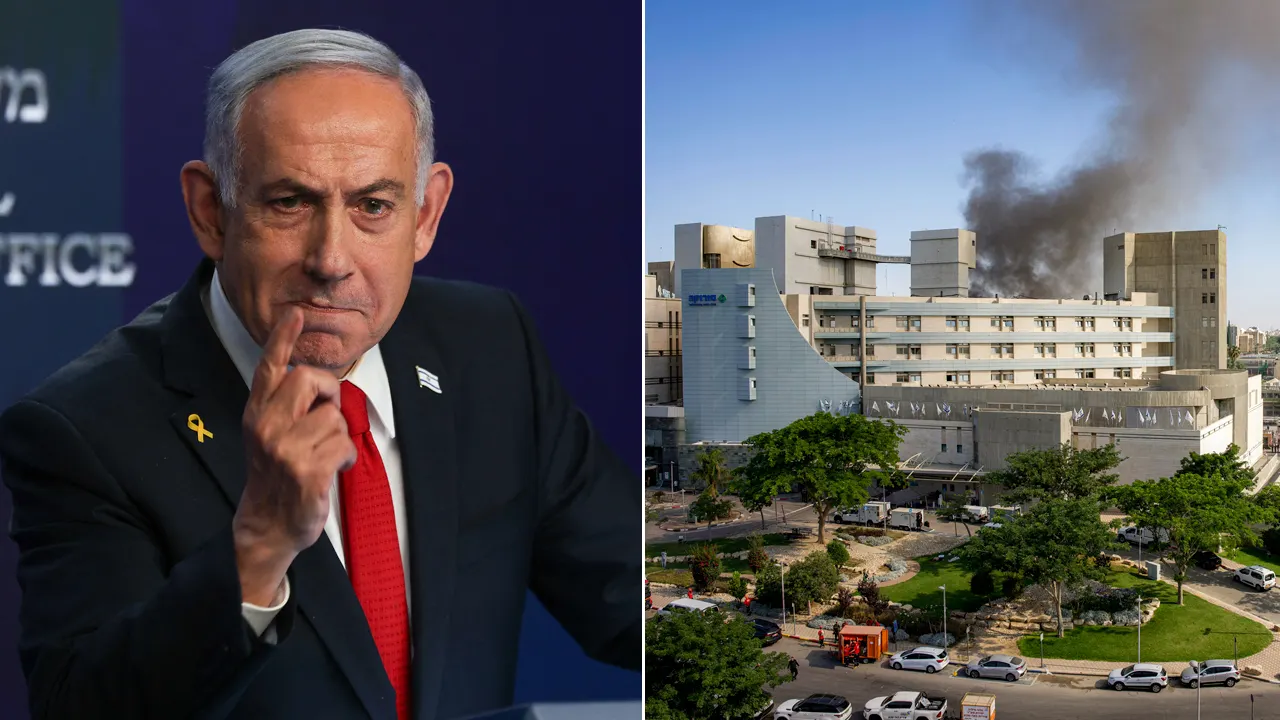BBC News, Nairobi
 Albert Ojvang / Facebook
Albert Ojvang / Facebook“My son died like an animal,” said Meshack Ojvang, before he broke the tears outside the journalist outside the Central Police Station in Kenya’s Capital, Nairobi.
His only son Albert Ojwang was arrested in his village Kakh, near the western city, the day before – on Saturday, 7. June 2025. – While he had lunch with his wife of Neivnina Oniango.
One of the five arrest officers told the family that he was accused of offending the police chief to social media.
“We asked the police whether it would be safe, because we heard the stories of some people were abducted,” said Mrs. Oniango told the BBC. “They convinced us, in a moment even to give us their number.”
When is G. Ojvang reserved in the central police station around 21:30 on Saturday night, it was allowed to telephoning his wife.
“When we talked, he was like,” As far as I stressed, don’t worry about that. See you soon. “I think that was his last words,” she said.
But his father was concerned and decided to follow his son, making a trip 350 km (220 miles) in the Nairobi – carrying a family title as security in case he needed to pay bail.
He says he arrived early on Sunday morning at the station, and after waiting several hours, in the end it was said that his son died of self-destructive wounds.
In disbelief, in addition to his lawyer, he described that he saw his son’s body: “He bleeding from his nose and had bruises and his face, but it was not how I was on Saturday Saturday.”
 Hassan Lali / BBC
Hassan Lali / BBCHis sincere interview in heart Swahili and his refusal to remain silent Kenyans and Hashtag # justiceforalbertoywang immediately started moving in relation to investigation calls.
Kenia has a history of police brutality, but subsequent revelation is stunning the nation – not only detail about death in police custody on a dressed teacher of the facing blogger, but also states allegations of police.
Parliament even called on the Chief of Police, the head of the Directorate for Criminal Investigations (DCI), Minister of Internal Affairs and Independent Police Supervision (IPOA).
It is difficult to imagine why 31-year-old graduated graduated graduate has violated such brutal circumstances.
It is clear that his father, who worked in the Young Kenya’s quarry, was proud to have done his son from such a modest beginnings so well-well.
“He could never hurt anyone or physically or physically,” said David Bvakali, former teaching colleagues in the Kitum high school, told the journalistic newspaper of the daily newspaper.
Albert Ojvang, passionate football fan in Manchester, lectured religious studies, history and rugby in the school in the city of Mvatata in Southeast Kenya.
He was only a few years for several terms, because he was not employed at the government contract, but private through the school board.
This is common for new teachers – did not end up on the University of Pvio – and such arrangements cannot be paid well.
Mr. Bvakali said his friend was recently in contact to talk about how he hoped to get the publication of the Government teacher.
And that was an exciting time for Mr. Ojvang, who lived in the coastal city of Malindi, because he and his 26-year-old woman returned to his house bay in a rural Homi house, so she could be properly familiar with the family.
They arrived in April and were, according to the conditions luo, formalizing their marriage.
Part of these traditions involved the renewal of their “Simba” or barrel “or Bachelor’s background in the house of his father – in a home suitable for a couple and their three-year-old son George.
He helped parents work some farms on a double plot of the family – and he and his wife made plans for his future with Mrs. Oniango’s family as a healthcare worker.
Mr. Ojwang also tried to earn as a car digital content – and was part of the movement of young people on social media publishing political and social issues.
It led to his death.
It is not clear how many followers had in X because his account was deleted after arrest, but colleagues were influenced that he had a strong internet presence and often participated in social media campaigns.
He used pseudonym – something that is not unusual with Kenyans on the network, they recently recently found the youth disagreement.
The activists linked their death to a wider trend of impunity, referring to unresolved deaths more than 60 young people during last year’s tax protests.
The death of “Ojwang is not an isolated incident, but excellent reminders of institutionalized impunity and thief behavior within the National Police Service (NPS),” Muslims for Human Rights (Muhuri) and the renowned human rights defense counsel, told local media.
But what is unusual in the case of Albert Ojvang is how fast and detailed investigation is. In addition, two days of television parliamentary hearings meant that Kenyans heard the disturbing details that led to his death.
When they appear before parliament last Wednesday, the Head of Police Douglas Kanja was forced to withdraw the earlier police statement that said that G. Ojwang found unconsciously in his cell and rushed to the hospital, where he died of head injuries, which died of head injuries, after dying from head injury.
The examination after the Mortium and an unusually rapid investigation by IPOA was convinced that the blogger had killed.
The police chief apologized and blamed the mistake of “misinformation” from its juniors.
He continued to say that the arrest of Mr. Ojvanga has produced from the slower network messages that targeted his deputy, Eliud Lagat – which has since deviated. Mr. Lagat said that he was doing this in the “good and conscious thought” of his responsibilities for the Deputy Chief of Police and will provide support that the contracts of Blogger’s death could investigate.
According to the statement of G. Held parliament, KS posts allegedly Lagat has led corrupt police operations by reliable clerks in certain departments and traffic shift on “controlled flows and flow of intelligence”.
Statement of G. Tangle detailed various posts, including those who claimed that Mr. Lagat was under investigation of ethical and anti-corruption commission (EACC), together with his photograph and phrase “Mafia”.
According to the Police Parliamentary Statement, G. Lagat filed a complaint DCI 4. June about posts. The next day, when the ECCC confirmed that there was no Laga Lag Investigation, the police continued what was considered a “serious case” under the act of abuse of computers and the Cyber crimin law.
Mr. Kanja said that the authority for communications was contacted about two orders associated with posts. He led to the arrest of man 5. June who discovered that he and four others were involved in the campaign – one is Albert Ojvang.
Two days later, the police followed Mr. Ojvang to his home village in Western Kenya.
 AFP / Getty Images
AFP / Getty ImagesIn his testimony, IPOA Vice President Anne Vanjik gave some shocking details about the last few hours of Life of Mr. Ojvang.
She said that two witnesses, who were in the neighboring cell, said IPOa that they heard a loud screams during the night died.
IPPOA investigators claim that the technician is paid $ 30 (£ 22) to turn off CCTV in the station.
After the end of the parliamentary debate, The two police officers were arrested in connection with the death of G. Ojvanga.
IPOA, which brings the case, said that the younger PC James Mukhvan told investigators that the intention was on the “discipline” of G. Ojwang, not kill him.
He said the officer was in charge of the station, Samson Talam, contacted. Lally with account and gave Consible $ 15 to pay two prisoners to beat y. Ojvang.
Mr. Talam, through his lawyers, denied the allegation and Mr. Lagat didn’t comment.
According to the law of Kenya, individuals in police detention are entitled to special protection, including the right to legal representation and communication with advocates or support.
Mr. Ojwang’s family still has difficulty absorption of their loss.
“I didn’t believe it until I saw his body in the morgue,” Mrs. Oniaangong said, saying the BBC to spend signs of torture. It was like “things we just see in the movies … I’ve never seen a body like that. It was such a broken heart,” she said.
President William Ruto, who promised to finish the Kenya’s history of police brutality and external death when he received about his shock, saying, “This tragic phenomenon, in the hands of the police is to break the heart and unacceptable.”
He called on the police to fully cooperate to facilitate the “fast, transparent and credible investigation”.
“I fully expect the truth about what happened to the Ojvang will be found in the foreseeable future and that justice will be served,” he added.
However, almost 160 cases of suspicious external killings and forced shortages were reported through Kenia last year, According to Kenia Human Rights Commission (KHRC)).
The IPOA chairman of the Ahmed Issack Hassan told representatives when he brought into question that at least 20 people in the last four months.
“It’s like our constitution only seems to be read, and we forget about it tomorrow,” said Father, Mr. Ojwanga said the BBC.
The sadness was overwhelmed by the widow of G. Ojvanga: “I don’t know what happens next, because it’s one person who was my best friend … He’s not there. So I feel like my world is so small and dark.”
But like her father-in-law, Mrs. Oniango believes in the case, which caused protests, could be a turning point.
“I think Albert’s death should be opened to us, because it showed us some of the things that happen in cells we may not know.
“I really want to talk to my colleagues to Kenny to stand on my feet and try to talk about this thing, so everyone can be responsible.”
You can also be interested in:
 Getty Images / BBC
Getty Images / BBC





